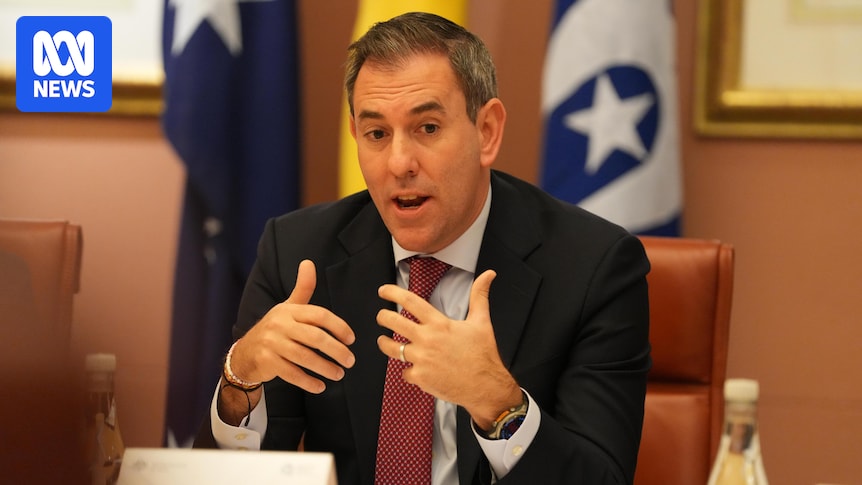Treasurer Jim Chalmers has conceded Australia’s tax system is “imperfect”, declaring he’s “won support” for broader tax reform that addresses intergenerational inequity at the government’s three-day economic reform summit in Canberra.
Mr Chalmers told reporters the “hard work begins now” after consensus was reached on 10 key priorities, from modernising government services and turbocharging housing supply to making artificial intelligence a national focus.
Wrapping up the round table on Thursday evening, Mr Chalmers thanked participants, saying they had come with “good will and good ideas”, but the challenge was now turning those suggestions into action with the input of the cabinet.
For three days, business leaders, union chiefs and bureaucrats were locked in the cabinet room, away from their phones and prying journalists, and fuelled by sushi and sandwiches, as they debated how to lift Australia’s flagging productivity.
The discussions were described by those in the room as constructive, with broad agreement reached on needing to shore up the sustainability of the budget, addressing intergenerational inequity in the tax system, streamlining approvals for housing projects and being forward-focused on artificial intelligence.
After tax reform loomed large as the prickliest issue between attendees on day three, Mr Chalmers would not rule out tax reform, including a potential road-user charge, being introduced before the next federal election.
He confirmed the government has landed on three priority areas for consideration on tax: intergenerational equity, incentivising business investment and simplifying the broader system as demographics change, including an ageing population.
“There was a lot of support for trying to put a structure around the work that we will now do as a government … to really try and address three objectives in the tax system,” Mr Chalmers said.
“The first one is about a fair go for working people and including in inter-generational equity terms.
“The second one was about an affordable, responsible way to incentivise business investment, recognising the capital deepening challenge that we have in the economy.
“And then thirdly, how we make the system simpler, more sustainable so that we can fund the services that people need.”
Mr Chalmers said there was broad agreement around the productivity roundtable for directions on tax reform. (ABC News: Ian Cutmore)
ABC News understands that Treasury and the Productivity Commission will be tasked with policy development in these areas in the months ahead.
In June, Treasurer Jim Chalmers told the National Press Club that “no sensible progress can be made on productivity, resilience or budget sustainability without proper consideration of more tax reform”.
But the prime minister later downplayed the prospect of any immediate changes, instead indicating that the ideas raised this week could shape the next three budgets or be put to the Australian people at the next election.
Where to from here?
Mr Chalmers also laid out a series of “quick wins” the government will move on.
These include abolishing hundreds more “nuisance tariffs” in consultation with Trade Minister Don Farrell and asking Housing Minister Clare O’Neil to simplify the National Construction Code and clear a backlog of environmental approvals.
Industry Minister Tim Ayres will also be asked to accelerate work on a national AI strategy, while Finance Minister Katy Gallagher has been tasked with drafting a regulatory reform bill this year to eliminate duplication and compliance burdens under a new “tell us once” principle.
Chalmers makes a roundtable switch-up as Butler blindsides
Perhaps the most significant shift was broad agreement on a future road user charge — a reform long seen as inevitable as fuel excise revenue shrinks with the uptake of electric and more efficient vehicles.
Mr Chalmers confirmed the idea now has momentum, though no model has yet been finalised.
NSW Treasurer Daniel Mookhey, whose state has legislated its own charge from 2027, will join other state counterparts in Canberra on September 5 to discuss how a national scheme could work.
Treasurer Daniel Mookhey has helped to lead a push towards a national road-user charge. (ABC News: Keana Naughton)
It’s understood that at this meeting the state and territory treasurers could also be asked to sign-off on a number of other ideas discussed over the course of the summit once they’ve been put to cabinet.
Mr Chalmers stressed that the summit’s suggestions would not override ministerial deliberations, but would be developed in partnership with colleagues and the states.
“I want to assure my cabinet colleagues, the government more broadly, that in this government, cabinet ministers are front and centre and all of the work that we propose to do, we propose to do together,” he said.
